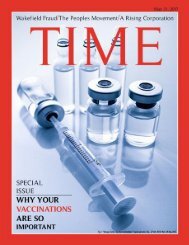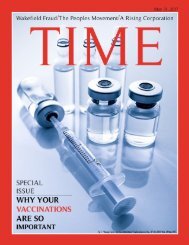JEP fin
Create successful ePaper yourself
Turn your PDF publications into a flip-book with our unique Google optimized e-Paper software.
Fifteenth Century-Today<br />
Fig 28:“How the Vaccine Schedule in the U.S. Has Evolved Since the 1950s (Part I).” March Against<br />
Monsanto. N.p., n.d. Web. 30 May 2017.<br />
2010: The Lancet completely retracts Andrew<br />
Wakefield’s study, admitting several<br />
elements of the paper were incorrect. His<br />
study had lead to a large decrease in vaccination<br />
rates around the world, and also<br />
increased studies pertaining to autism. This<br />
retraction and the court cases that followed<br />
him caused him to fall into disrepute 48 .<br />
1998: A study published in The Lancet by Andrew Wakefield suggests<br />
that the measles-mumps-rubella (MMR) vaccine causes autism. The <strong>fin</strong>dings<br />
within the study were quickly debunked by adept 46 scientists<br />
2012: A study <strong>fin</strong>ds that aluminum is causing the MMR vaccine<br />
to be harmful (Batts para 5).<br />
2000: ‘Vaccine manufacturers<br />
remove thimerosal (a mercury-based<br />
preservative) from<br />
all routinely given childhood<br />
vaccines due to public fears”<br />
(Rasmussen para 5) about its<br />
role in autism--even though,<br />
again, the vaccine-autism link<br />
has been debunked.<br />
2011: “A systematic<br />
review of immunizations<br />
within the US reveals<br />
that there was stong<br />
evidence pointing to no<br />
association between the<br />
MMR vaccination and<br />
the occurance of autism”<br />
(Maglione para 3).<br />
2004: Known as the “watershed year in the MMR-autism<br />
debate” by vaccine sceptics becauseformer Florida<br />
Representative David Weldon chastised the CDC and<br />
IOM for using false data” (Wachtler para 5).<br />
Fig 29:“Parents.” Learning Disabilities Association of America. N.p., n.d. Web. 30<br />
May 2017.<br />
2013: The DSM-5 puts all the once abstruse 47 subcategories of the condition into<br />
one umbrella diagnosis of autism spectrum disorder (ASD). Asperger’s Syndrome<br />
is no longer considered a separate condition. ASD is de<strong>fin</strong>ed by two categories: 1)<br />
Restricted and/or repetitive behaviors. 2) Impaired social communication and/or<br />
interaction.<br />
May 31, 2017 TIME 29





